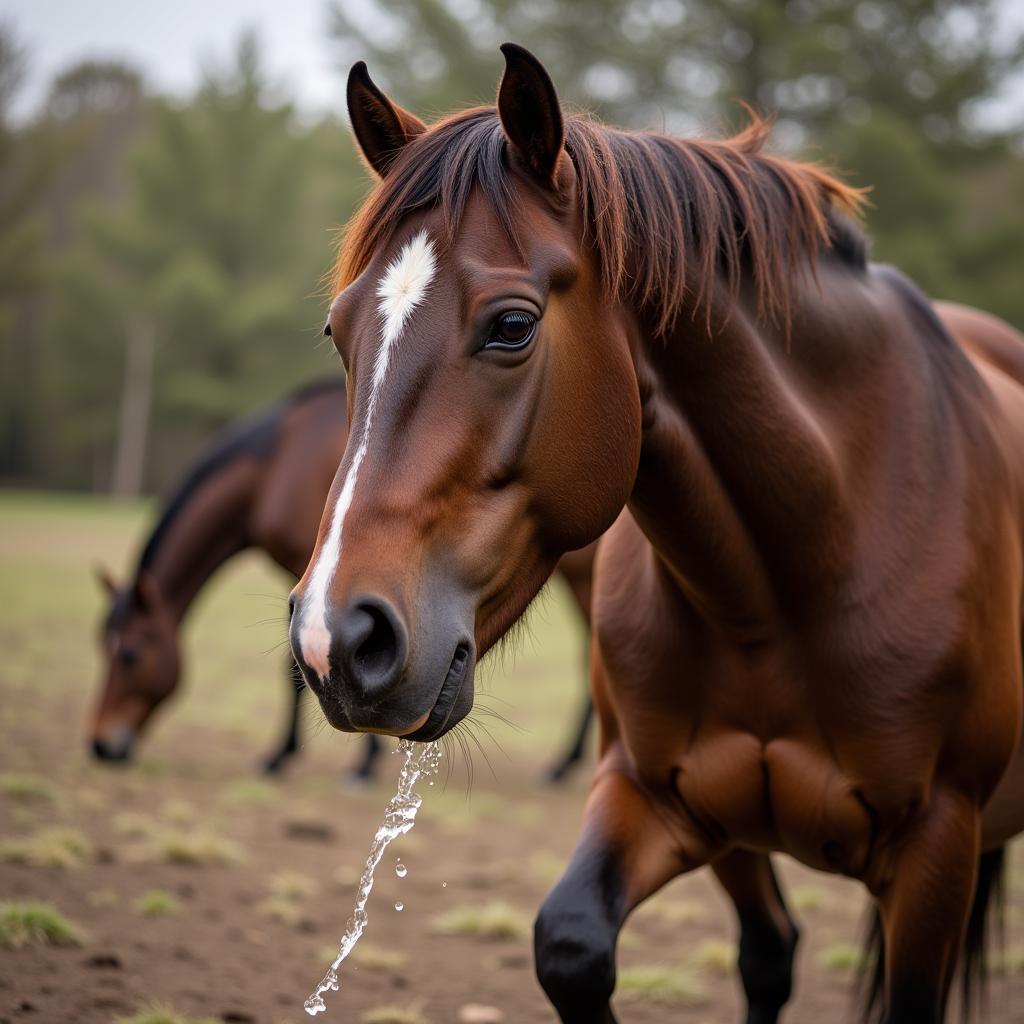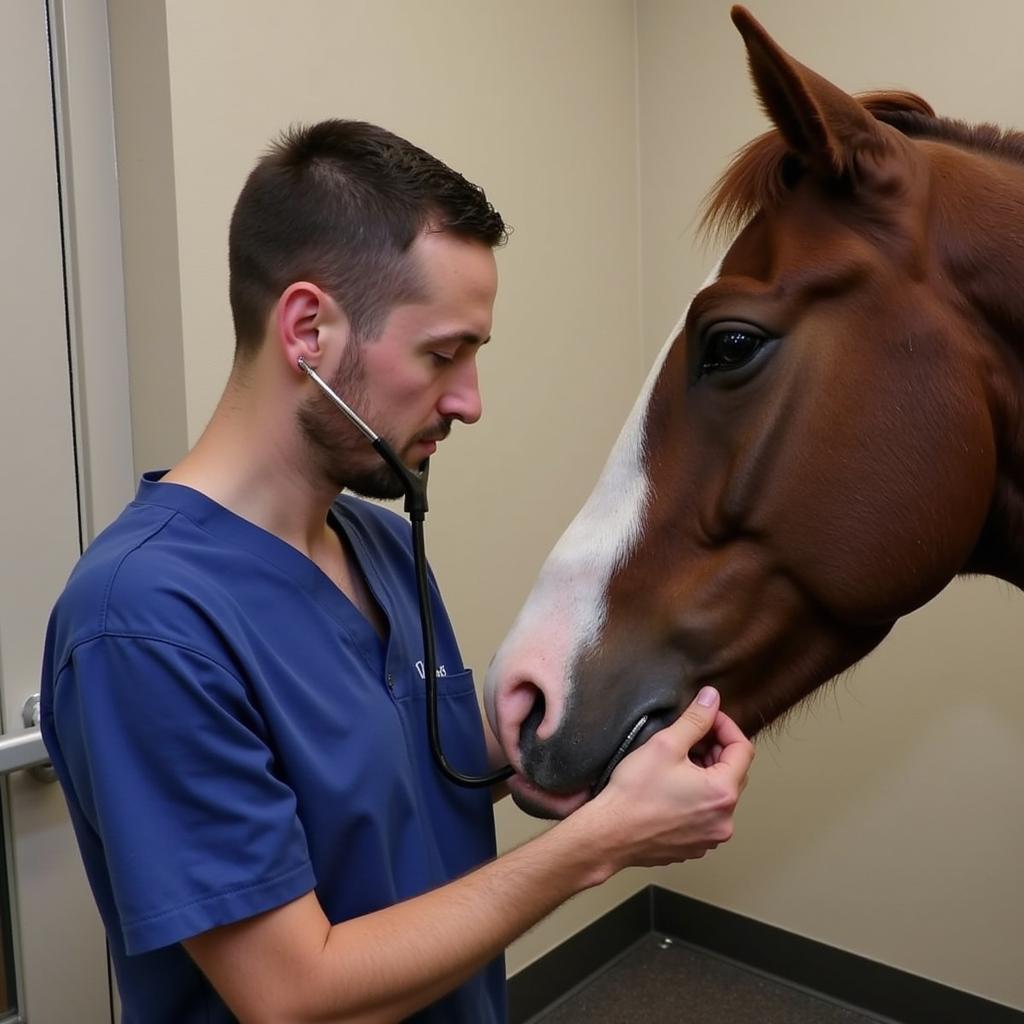Horse Puke, or more accurately, attempting to vomit, is a serious issue that requires immediate veterinary attention. Unlike humans and many other animals, horses cannot easily vomit. Their powerful esophageal sphincter and the angle at which the esophagus enters the stomach make it nearly impossible for them to regurgitate food or fluids. This anatomical peculiarity means that when a horse appears to be trying to vomit, it signals a potentially life-threatening problem.
Why Can’t Horses Puke Easily?
Horses have a very strong lower esophageal sphincter, a muscular ring that acts like a one-way valve, allowing food to pass into the stomach but preventing it from coming back up. The angle of the esophagus as it enters the stomach also contributes to this inability to vomit. This means any pressure buildup in the stomach, whether from gas, food, or fluid, cannot be relieved through vomiting, potentially leading to a ruptured stomach or esophagus.
Recognizing the Signs of a Horse Trying to Vomit
While horses can’t technically vomit, they can exhibit signs that they are trying to. These signs can include:
- Repeated stretching of the neck
- Excessive salivation
- Frequent swallowing
- Retching sounds
- Discharge of green-tinged fluid from the nostrils (this can be mistaken for nasal discharge but is often stomach contents escaping through the nasal passages)
- Signs of colic, such as pawing, rolling, flank watching, and sweating
 Horse Showing Signs of Trying to Vomit
Horse Showing Signs of Trying to Vomit
Common Causes of Attempted Vomiting in Horses
Several conditions can cause a horse to exhibit signs of trying to vomit. These include:
- Esophageal Obstruction (choke): This occurs when food becomes lodged in the esophagus, preventing normal passage to the stomach.
- Gastric Rupture: A tear in the stomach wall, often due to excessive pressure.
- Small Intestinal Obstruction: Blockages in the small intestine can cause a buildup of pressure that backs up into the stomach.
- Gastritis: Inflammation of the stomach lining.
- Enteritis: Inflammation of the small intestine.
- Certain Toxins: Ingestion of poisonous plants or other toxic substances.
What to Do if Your Horse Seems to Be Trying to Vomit
If your horse displays any signs of attempting to vomit, it’s crucial to act quickly. Immediately contact your veterinarian. Do not attempt to treat the horse yourself. Giving medications or food can worsen the situation. Keep the horse calm and comfortable while waiting for the vet.
 Veterinarian Examining Horse with Suspected Choke
Veterinarian Examining Horse with Suspected Choke
“Early intervention is key when a horse exhibits signs of trying to vomit,” says Dr. Emily Carter, DVM, equine specialist at Justus Horses USA. “The sooner the underlying cause is diagnosed and treated, the better the chances of a positive outcome.”
Diagnosing the Cause of Attempted Vomiting
Your veterinarian will perform a thorough examination to determine the cause of the problem. This may involve:
- Physical examination, including checking the horse’s vital signs and palpating the abdomen.
- Passing a nasogastric tube to check for obstructions and relieve pressure.
- Blood tests to assess organ function.
- Ultrasound or radiographs to visualize the digestive tract.
- Endoscopy to examine the esophagus and stomach.
Treatment Options for Horses Trying to Vomit
Treatment depends on the underlying cause. It might include:
- Fluids and supportive care
- Medication to reduce inflammation or pain
- Surgery in cases of obstruction or rupture
Dr. John Miller, DVM, another equine specialist at Justus Horses USA, advises, “Preventing potential causes like choke is essential. Ensure your horse has access to plenty of fresh water, avoid feeding dusty or moldy hay, and introduce new feeds gradually.”
Conclusion: Taking Horse Puke Seriously
Horse puke, or more accurately, the attempt to vomit, is a serious sign that should never be ignored. The inability of horses to vomit effectively makes any attempt to do so a red flag for a potentially life-threatening condition. Prompt veterinary attention is crucial for diagnosing the underlying cause and providing appropriate treatment. By understanding the signs and potential causes, horse owners can take swift action to protect their horses’ health.
FAQ
- Can horses actually vomit? No, horses cannot vomit in the same way as humans or other animals due to their anatomical structure.
- What should I do if my horse looks like it’s trying to vomit? Immediately contact your veterinarian.
- Is choke a life-threatening condition in horses? Yes, choke can be life-threatening if not treated promptly.
- What are the common causes of choke? Choke is often caused by dry or poorly chewed food, eating too quickly, or dental problems.
- Can I treat my horse’s choke myself? No, do not attempt to treat choke yourself. Always consult a veterinarian.
- How can I prevent choke in my horse? Ensure your horse has access to plenty of fresh water, soak dry hay or feed pellets, and address any dental issues.
- What are the long-term effects of a horse trying to vomit? The long-term effects depend on the underlying cause and the timeliness of treatment. Early intervention often leads to a full recovery.
For further information on horse health and care, please explore other articles on our website, such as “Understanding Equine Colic” and “Essential First Aid for Horse Owners.”
When you need assistance, please contact us at Phone Number: 0772127271, Email: [email protected] Or visit us at: QGM2+WX2, Vị Trung, Vị Thuỷ, Hậu Giang, Việt Nam. We have a 24/7 customer service team.